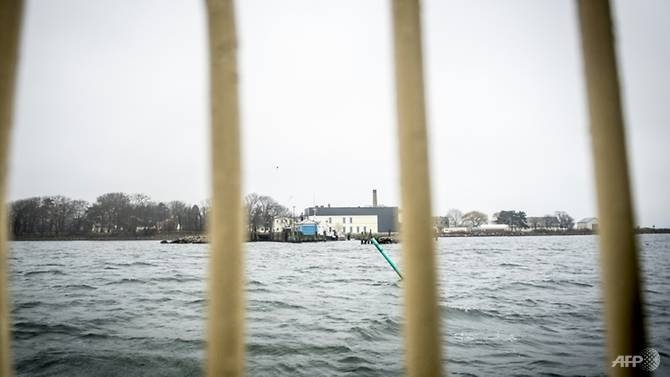Island exile the latest Danish blow for 'unwanted' migrants
 |
| Lindholm island, where the migrants will be housed, used to house a veterinary institute researching infectious animal diseases. (Photo: AFP/Mads Claus Rasmussen) |
Those selected will live in buildings once used by scientists for research on infectious diseases in animals.
The proposal has brought thousands of Danes out on to the streets to protest and made headlines around the world.
But the measure is part of a clear message from the government to foreigners: Denmark is full, and it cannot take any more migrants without jeopardising its social welfare model.
To get that message across, the government has multiplied the obstacles for would-be immigrants and introduced almost 100 amendments restricting the rights of migrants.
This proposal is the latest in a long series.
The island exile idea was proposed by the populist, anti-immigration Danish People's Party (DPP), which is not part of the government but the idea was snapped up by the ruling centre-right coalition.
The "unwanted" migrants who will live there include those with criminal records in the process of being deported, said a government statement.
Others include those already rejected for refugee status, but cannot be deported because of security concerns.
Controversial Immigration Minister Inger Stojberg of the conservative Liberal Party - which leads the coalition - put it more bluntly in a Facebook post.
"If you are unwanted in Danish society, you should not be a nuisance to ordinary Danes," she wrote.
"They are undesirable in Denmark, and they must feel it!"
'GO HOME'
"The Danes, they are quite welcoming," said, Dejene, a 30-year-old asylum seeker from Ethiopia at Trampoline House, a support centre in Copenhagen for refugees and asylum seekers.
"But the system, that's really another story," he added. "They say out loud they don't want us here. This country is not for foreigners."
Morten Goll, who runs Trampoline house, agrees: "Newcomers are losing their appetite to become Danish."
Since the 2015 surge in refugees making the perilous Mediterranean crossing into Europe, the Danish government has steadily and vocally hardened its line on immigration.
In 2015, the government ran adverts in the Lebanese press warning would-be immigrants that Copenhagen was toughening its conditions.
The next year, it approved measures including the confiscation of cash and valuables belonging to migrants, and an extension from one year to three for family reunifications.
And it has suspended its participation in the UN refugee agency programme, under which countries accept a quota of refugees.
Denmark has a population of 5.8 million and 8.5 per cent of them are of "non-western" origin, according to the national statistics institute.
And with elections due next year, the government's aim is clear: refugees have to know that they cannot stay forever.
The latest proposal to go before parliament is a cut in benefits to foreigners: 150 euros less for single persons, who currently get 1,600, and 270 euros less for couples, who receive 2,200 euros.
"They have to go home and help rebuild their countries as soon as possible," said Martin Henriksen, migration spokesman for the People's Party.
"This is a fair and reasonable principle."
'TOUGHNESS AND INTOLERANCE'
Between 2015 and 2017, the number of asylum requests to Denmark fell by 75 per cent.
For Demetrios Papademetriou of the Migration Policy Institute, Denmark's policies are at the extreme end of a Europe-wide trend.
"The Danish government's official behaviour toward migrants is an exception in its toughness and intolerance," he said.
And while it may not be part of the government, the engine behind many of these changes has been the DPP, Papademetriou added.
"No other party that opposes immigration in Europe has been as successful in shaping national policy on all migration-related issues as deeply, or for as long a period of time," he said.
Trine Christensen, secretary general of Amnesty International, took heart from the protests that greeted the island proposal.
"Danes don't demonstrate in great numbers very often," she said. "It seems people across Denmark feel the politicians are going too far."
But the latest polls suggested the DPP has 18 per cent support, maintaining its position as the second-largest party in the country.
With elections just a few months away, it is neck-and-neck with the Liberal Party.
What the stars mean:
★ Poor ★ ★ Promising ★★★ Good ★★★★ Very good ★★★★★ Exceptional
Related Contents
Latest News
More News
- Russian President congratulates Vietnamese Party leader during phone talks (January 25, 2026 | 09:58)
- Worldwide congratulations underscore confidence in Vietnam’s 14th Party Congress (January 23, 2026 | 09:02)
- Political parties, organisations, int’l friends send congratulations to 14th National Party Congress (January 22, 2026 | 09:33)
- 14th National Party Congress: Japanese media highlight Vietnam’s growth targets (January 21, 2026 | 09:46)
- 14th National Party Congress: Driving force for Vietnam to continue renewal, innovation, breakthroughs (January 21, 2026 | 09:42)
- Vietnam remains spiritual support for progressive forces: Colombian party leader (January 21, 2026 | 08:00)
- Int'l media provides large coverage of 14th National Party Congress's first working day (January 20, 2026 | 09:09)
- Vietnamese firms win top honours at ASEAN Digital Awards (January 16, 2026 | 16:45)
- ASEAN Digital Ministers' Meeting opens in Hanoi (January 15, 2026 | 15:33)
- ASEAN economies move up the global chip value chain (December 09, 2025 | 13:32)

 Tag:
Tag:




















 Mobile Version
Mobile Version